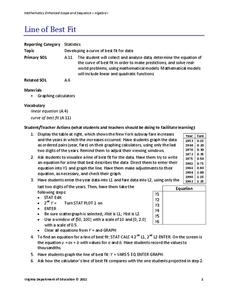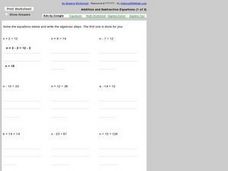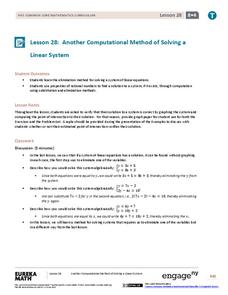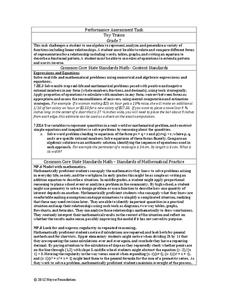Virginia Department of Education
Line of Best Fit
Pupils work through a guided activity on fitting a linear equation to a set of data by entering the data into a calculator and trying to envision a line of best fit. They then have the calculator determine the least-squares line and...
EngageNY
Mixture Problems
What percent of the mixture is juice? Pairs use their knowledge of proportions to determine what percent a mixture is juice given the percent of juice in the components. Pupils use the procedure learned with the juice mixture problem to...
Flipped Math
Unit 9 Review: Factoring
Make it complete. Pupils work through 16 problems to review factoring. The problems consist of straight factoring of polynomial expressions, solving equations by factoring, and applying factoring to real-world problems.
Math Solutions
Dr. Seuss Comes to Middle School Math Class
If you think Dr. Seuss has no place in a math classroom, then take a look at this resource. Based on the classic children's book Green Eggs and Ham, this sequence of activities engages children learning to model real-world contexts...
Mathematics Vision Project
Module 4: Linear and Exponential Functions
Sequences and series are traditionally thought of as topics for the pre-calculus or calculus class, when learners are figuring out how to develop limits. But this unit uses patterns and slopes of linear functions in unique ways...
Radford University
Summer Woes!
Who can afford the computer required to land a summer job? Pupils work in pairs to solve problems related to finding the number of hours needed to work to purchase a given item. Individuals then work on a performance-based assessment to...
Curated OER
Worksheet 7 - Derivative
In this derivative worksheet, students derive the equation of a plane containing given points. This one-page worksheet contains eight multi-step problems.
Illustrative Mathematics
How Many Solutions?
Determining the number of solutions is an important stepping stone to higher math. In this case, the resource asks algebra pupils to find a second linear equation for a certain solution of a system. When one is asked for a linear...
Curated OER
Balancing Act
In this chemistry worksheet, students determine the number of atoms in each element and select one that is not equal on both sides of the equation. Then they add a coefficient in front of the formula with that element and adjust their...
Curated OER
Equations of Lines Perpendicular and Parallel
For this algebra worksheet, students solve linear equations using one and two steps. They solve systems of equations using substitution and elimination with graphing. There are links for ready made tests and quizzes.
Helping with Math
#5: Addition & Subtraction Equations (1 of 2)
Single-step addition or subtraction operations are applied in order to solve these 12 simple equations. An answer key is available, not so much for you, but perhaps to be used by learners as a self-correction tool. Note that the...
Curated OER
Graph Dynamic Linear Equations
Students explore the concept of linear equations. In this linear equation lesson, students change parameters of an equation and notice the effect it has on its graph.
Helping with Math
#10: Solving Equations (2 of 2)
In this prealgebra activity, pupils perform addition, subtraction, multiplication, or division operations to solve for an unknown. There are 12 problems to be solved. Use this as a quiz to assess how well your class is grasping the skill...
Curated OER
Algebra: Addition and Subtraction Equations
In this algebra practice learning exercise, students use their math skills to solve 15 equations that require them to add and subtract decimal numbers.
Benjamin Franklin High School
Saxon Math: Algebra 2 (Section 3)
In this third of a twelve-part series, the focus moves from using matrices to solving systems of equations with substitution and elimination, including more than two dimensions and variables in equations, and analyzing statistical data....
Inside Mathematics
Conference Tables
Pupils analyze a pattern of conference tables to determine the number of tables needed and the number of people that can be seated for a given size. Individuals develop general formulas for the two growing number patterns and...
Curated OER
Weighted Averages
Weighted averages can be tricky to explain! However, this study guide makes it easy for teachers by including definitions, explanations, and breaking down problems into three steps. Includes mixture problems and uniform motion problems.
Curated OER
Solving Linear Inequalities
Walk the class through the steps of how to evaluate linear inequalities in one variable and graph the solution set. Define and discuss key vocabulary terms, then have individuals work problems of varying difficulty. Included are word...
EngageNY
Another Computational Model of Solving a Linear System
The process of elimination really works! Use elimination when substitution isn't doing the job. The 29th segment in a series of 33 introduces the elimination method to solving linear systems. Pupils work several exercises to grasp the...
Noyce Foundation
Toy Trains
Scholars identify and continue the numerical pattern for the number of wheels on a train. Using the established pattern and its inverse, they determine whether a number of wheels is possible. Pupils finish...
Willow Tree
Linear Relationships
There's just something special about lines in algebra. Introduce your classes to linear equations by analyzing the linear relationship. Young mathematicians use input/output pairs to determine the slope and the slope-intercept formula to...
Science Geek
Stoichiometry
Watch your class react when you tell them they're going to study stoichiometry! The lesson demonstrates four examples. Scholars must write and balance the chemical equation and then make the conversion to find the correct mass or volume....
PBL Pathways
College Costs
Predict the year that college costs will double in your state using linear modeling. The first part of this two-part project based learning activity asks young mathematicians to use data from the College Board. They graph the data,...
Inside Mathematics
Party
Thirty at the party won't cost any more than twenty-five. The assessment task provides a scenario for the cost of a party where the initial fee covers a given number of guests. The class determines the cost for specific numbers of guests...























